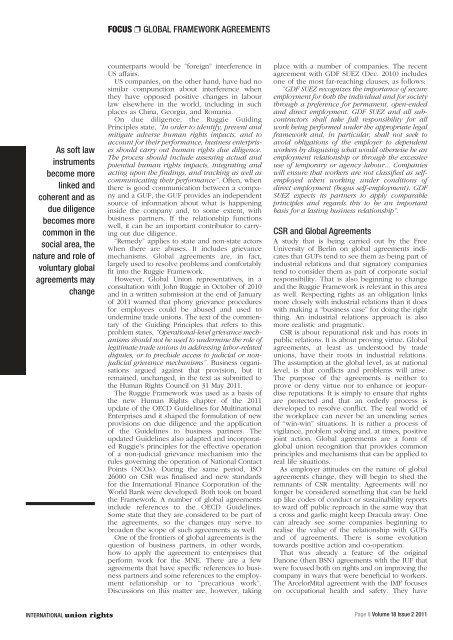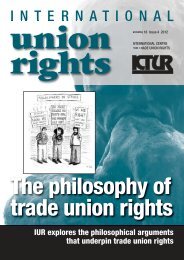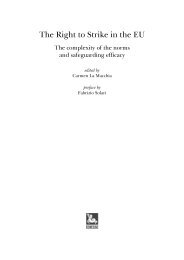Global Framework Agreements - International Centre for Trade ...
Global Framework Agreements - International Centre for Trade ...
Global Framework Agreements - International Centre for Trade ...
Create successful ePaper yourself
Turn your PDF publications into a flip-book with our unique Google optimized e-Paper software.
FOCUS ❐ GLOBAL FRAMEWORK AGREEMENTSAs soft lawinstrumentsbecome morelinked andcoherent and asdue diligencebecomes morecommon in thesocial area, thenature and role ofvoluntary globalagreements maychangecounterparts would be “<strong>for</strong>eign” interference inUS affairs.US companies, on the other hand, have had nosimilar compunction about interference whenthey have opposed positive changes in labourlaw elsewhere in the world, including in suchplaces as China, Georgia, and Romania.On due diligence, the Ruggie GuidingPrinciples state, “In order to identify, prevent andmitigate adverse human rights impacts, and toaccount <strong>for</strong> their per<strong>for</strong>mance, business enterprisesshould carry out human rights due diligence.The process should include assessing actual andpotential human rights impacts, integrating andacting upon the findings, and tracking as well ascommunicating their per<strong>for</strong>mance”. Often, whenthere is good communication between a companyand a GUF, the GUF provides an independentsource of in<strong>for</strong>mation about what is happeninginside the company and, to some extent, withbusiness partners. If the relationship functionswell, it can be an important contributor to carryingout due diligence.“Remedy” applies to state and non-state actorswhen there are abuses. It includes grievancemechanisms. <strong>Global</strong> agreements are, in fact,largely used to resolve problems and com<strong>for</strong>tablyfit into the Ruggie <strong>Framework</strong>.However, <strong>Global</strong> Union representatives, in aconsultation with John Ruggie in October of 2010and in a written submission at the end of Januaryof 2011 warned that phony grievance procedures<strong>for</strong> employees could be abused and used toundermine trade unions. The text of the commentaryof the Guiding Principles that refers to thisproblem states, “Operational-level grievance mechanismsshould not be used to undermine the role oflegitimate trade unions in addressing labor-relateddisputes, or to preclude access to judicial or nonjudicialgrievance mechanisms”. Business organisationsargued against that provision, but itremained, unchanged, in the text as submitted tothe Human Rights Council on 31 May 2011.The Ruggie <strong>Framework</strong> was used as a basis ofthe new Human Rights chapter of the 2011update of the OECD Guidelines <strong>for</strong> MultinationalEnterprises and it shaped the <strong>for</strong>mulation of newprovisions on due diligence and the applicationof the Guidelines to business partners. Theupdated Guidelines also adapted and incorporatedRuggie’s principles <strong>for</strong> the effective operationof a non-judicial grievance mechanism into therules governing the operation of National ContactPoints (NCOs). During the same period, ISO26000 on CSR was finalised and new standards<strong>for</strong> the <strong>International</strong> Finance Corporation of theWorld Bank were developed. Both took on boardthe <strong>Framework</strong>. A number of global agreementsinclude references to the OECD Guidelines.Some state that they are considered to be part ofthe agreements, so the changes may serve tobroaden the scope of such agreements as well.One of the frontiers of global agreements is thequestion of business partners, in other words,how to apply the agreement to enterprises thatper<strong>for</strong>m work <strong>for</strong> the MNE. There are a fewagreements that have specific references to businesspartners and some references to the employmentrelationship or to “precarious work”.Discussions on this matter are, however, takingplace with a number of companies. The recentagreement with GDF SUEZ (Dec. 2010) includesone of the most far-reaching clauses, as follows:“GDF SUEZ recognizes the importance of secureemployment <strong>for</strong> both the individual and <strong>for</strong> societythrough a preference <strong>for</strong> permanent, open-endedand direct employment. GDF SUEZ and all subcontractorsshall take full responsibility <strong>for</strong> allwork being per<strong>for</strong>med under the appropriate legalframework and, in particular, shall not seek toavoid obligations of the employer to dependentworkers by disguising what would otherwise be anemployment relationship or through the excessiveuse of temporary or agency labour... Companieswill ensure that workers are not classified as selfemployedwhen working under conditions ofdirect employment (bogus self-employment). GDFSUEZ expects its partners to apply comparableprinciples and regards this to be an importantbasis <strong>for</strong> a lasting business relationship”.CSR and <strong>Global</strong> <strong>Agreements</strong>A study that is being carried out by the FreeUniversity of Berlin on global agreements indicatesthat GUFs tend to see them as being part ofindustrial relations and that signatory companiestend to consider them as part of corporate socialresponsibility. That is also beginning to changeand the Ruggie <strong>Framework</strong> is relevant in this areaas well. Respecting rights as an obligation linksmore closely with industrial relations than it doeswith making a “business case” <strong>for</strong> doing the rightthing. An industrial relations approach is alsomore realistic and pragmatic.CSR is about reputational risk and has roots inpublic relations. It is about proving virtue. <strong>Global</strong>agreements, at least as understood by tradeunions, have their roots in industrial relations.The assumption at the global level, as at nationallevel, is that conflicts and problems will arise.The purpose of the agreements is neither toprove or deny virtue nor to enhance or jeopardisereputations. It is simply to ensure that rightsare protected and that an orderly process isdeveloped to resolve conflict. The real world ofthe workplace can never be an unending seriesof “win-win” situations. It is rather a process ofvigilance, problem solving and, at times, positivejoint action. <strong>Global</strong> agreements are a <strong>for</strong>m ofglobal union recognition that provides commonprinciples and mechanisms that can be applied toreal life situations.As employer attitudes on the nature of globalagreements change, they will begin to shed theremnants of CSR mentality. <strong>Agreements</strong> will nolonger be considered something that can be heldup like codes of conduct or sustainability reportsto ward off public reproach in the same way thata cross and garlic might keep Dracula away. Onecan already see some companies beginning torealise the value of the relationship with GUFsand of agreements. There is some evolutiontowards positive action and co-operation.That was already a feature of the originalDanone (then BSN) agreements with the IUF thatwere focused both on rights and on improving thecompany in ways that were beneficial to workers.The ArcelorMital agreement with the IMF focuseson occupational health and safety. They haveINTERNATIONAL union rights Page 8 Volume 18 Issue 2 2011





